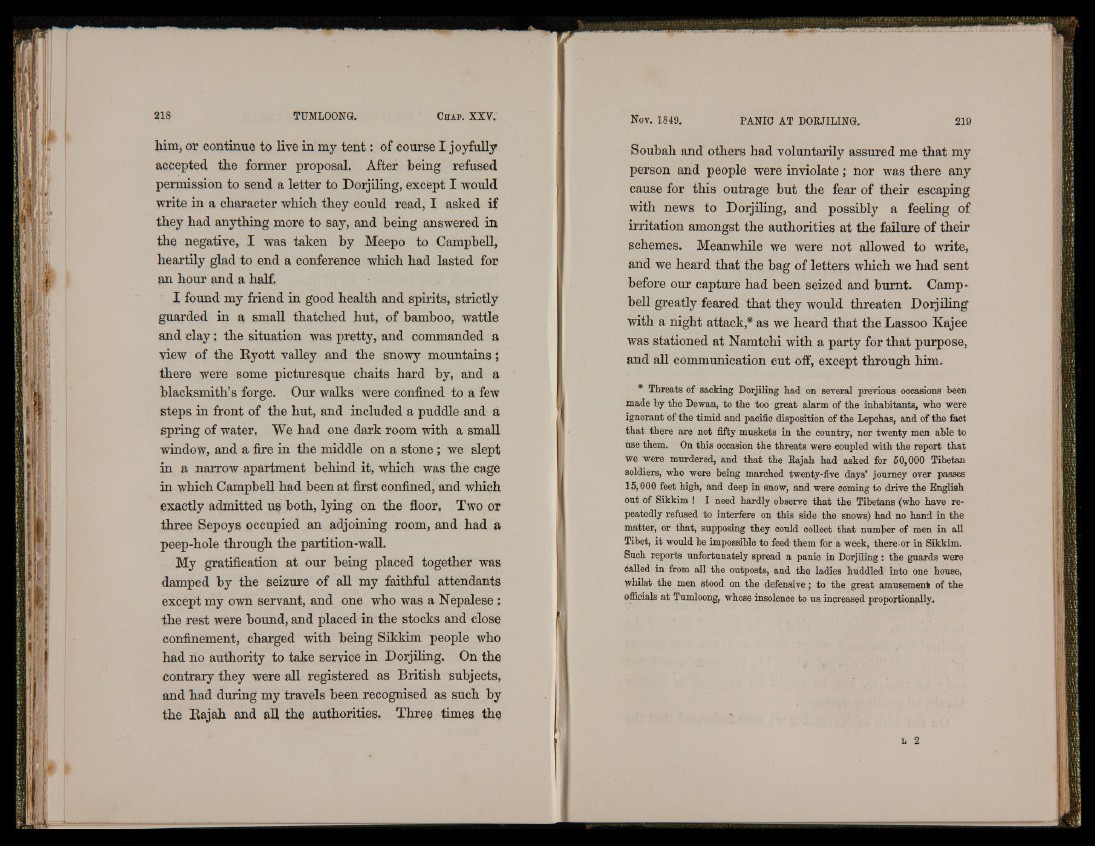
him, or continue to live in my te n t: of course I joyfully
accepted the former proposal, After being refused
permission to send a letter to Dorjiling, except I would
write in a character which they could read, I asked if
they had anything more to say, and being answered in
the negative, I was taken by Meepo to Campbell,
heartily glad to end a conference which had lasted for
an hour and a half.
I found my friend in good health and spirits, strictly
guarded in a small thatched hut, of bamboo, wattle
and clay; the situation was pretty, and commanded a
view of the Eyott valley and the snowy mountains;
there were some picturesque charts hard by, and a
blacksmith’s forge. Our walks were confined to a few
steps in front of the hut, and included a puddle and a
spring of water. We had one dark room with a small
window, and a fire in the middle on a stone; we slept
in a narrow apartment behind it, which was the cage
in which Campbell had been at first confined, and which
exactly admitted us both, lying on the floor. Two or
three Sepoys occupied an adjoining room, and had a
peep-hole through the partition-wall.
My gratification at our being placed together was
damped by the seizure of all my faithful attendants
except my own servant, and one who was a Nepalese;
the rest were bound, and placed in the stocks and close
confinement, charged with being Sikkim people who
had no authority to take service in Dorjiling. On the
contrary they were all registered as British subjects,
and had during my travels been recognised as such by
the Bajah and all the authorities. Three times the
Soubah and others had voluntarily assured me that my
person and people were inviolate ; nor was there any
cause for this outrage but the fear of their escaping
with news to Dorjiling, and possibly a feeling of
irritation amongst the authorities at the failure of their
schemes. Meanwhile we were not allowed to write,
and we heard that the bag of letters which we had sent
before our capture had been seized and burnt. Campbell
greatly feared that they would threaten Doijiling
with a night attack,* as we heard that the Lassoo Kajee
was stationed at Namtchi with a party for that purpose,
and all communication cut off, except through him.
* Threats of sacking Dorjiling had on several previous occasions been
made by the Dewan, to the too great alarm of the inhabitants, who were
ignorant of the timid and pacific disposition of the Lepchas, and of the &ct
that there are not fifty muskets in the country, nor twenty men able to
úse them. On this occasion the threats were coupled with the report that
We were murdered, and that the Rajah had asked for 50,000 Tibetan
soldiers, who were being marched twenty-five days’ journey over passes
15,000 feet high, and deep in snow, and were coming to drive the English
out of Sikkim ! I need hardly observe that the Tibetans (who have repeatedly
refused to interfere on this side the snows) had no hand in the
matter, or that, supposing they could collect that number of men in all
Tibet, it would be impossible to feed them for a week, there or in Sikkim.
Such reports unfortunately spread a panic in Dorjiling : the guards were
(Sailed in from all the outposts, and the ladies huddled into one house,
Whilst the men stood on the defensive ; to the great amusement of the
officials at Tumloong, whose insolence to us increased proportionally.